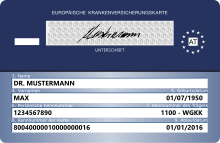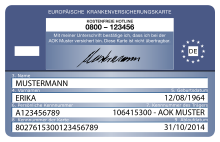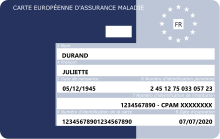European Health Insurance Card
The European Health Insurance Card (EHIC) is issued free of charge and allows anyone who is insured by or covered by a statutory social security scheme of the EEA countries, Switzerland, and the United Kingdom to receive medical treatment in another member state free or at a reduced cost, if that treatment becomes necessary during their visit (for example, due to illness or an accident), or if they have a chronic pre-existing condition which requires care such as kidney dialysis. The term of validity of the card varies according to the issuing country. Continued reciprocal healthcare access between the EU and the UK has been agreed, and the UK is issuing a new UK Global Health Insurance Card (GHIC) valid in the EU.[4]
The intention of the scheme is to allow people to continue their stay in a country without having to return home for medical care; as such, it does not cover people who have visited a country for the purpose of obtaining medical care, nor does it cover non-urgent care that can be delayed until the individual returns to their home country (for example, most dental care). The costs not covered by self-liability fees are paid by the issuing country, which is usually the country of residence but may also be the country where one receives the most pension from.[5]
It only covers healthcare which is normally covered by a statutory health care system in the visited country, so it does not render travel insurance obsolete.
The card was phased in from 1 June 2004 and throughout 2005, becoming the sole healthcare entitlement document on 1 January 2006.
The card is applicable in all French overseas departments (Martinique, Guadeloupe, Réunion, and French Guiana) as they are part of the EEA, but not non-EEA dependent territories such as Aruba, or French Polynesia.[6] However, there are agreements for the use of the EHIC in the Faroe Islands and Greenland,[7] even though they are not in the EEA.
The reason for the existence of this card, is that the right to health care in the European Union is based on the country of legal residence, not the country of citizenship. Therefore, a passport is not enough to receive health care. It is however possible that a photo ID document is asked for, since the European Health Insurance Card does not contain a photo.



